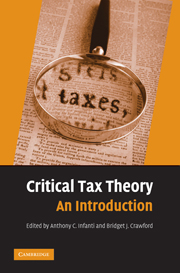Book contents
- Frontmatter
- Contents
- List of Illustrations
- List of Tables
- List of Contributors
- List of Common Abbreviations
- Introduction
- CHAPTER 1 FOUNDATIONS OF CRITICAL TAX THEORY
- CHAPTER 2 HISTORICAL PERSPECTIVES ON TAXATION
- CHAPTER 3 THE GOALS OF TAX POLICY
- CHAPTER 4 CRITICAL TAX THEORY MEETS PRACTICE
- CHAPTER 5 RACE AND TAXATION
- CHAPTER 6 GENDER AND TAXATION
- Not Color- or Gender-Neutral: New Tax Treatment of Employment Discrimination Damages
- Taxing Housework
- The Marital Deduction QTIP Provisions: Illogical and Degrading to Women
- A Taxing Woman: The Relationship of Feminist Scholarship to Tax
- CHAPTER 7 SEXUAL ORIENTATION AND TAXATION
- CHAPTER 8 THE FAMILY AND TAXATION
- CHAPTER 9 CLASS AND TAXATION
- CHAPTER 10 DISABILITY AND TAXATION
- CHAPTER 11 GLOBAL CRITICAL PERSPECTIVES ON TAXATION
- CHAPTER 12 CRITICAL PERSPECTIVES ON CRITICAL TAX THEORY
- Index
A Taxing Woman: The Relationship of Feminist Scholarship to Tax
Published online by Cambridge University Press: 04 August 2010
- Frontmatter
- Contents
- List of Illustrations
- List of Tables
- List of Contributors
- List of Common Abbreviations
- Introduction
- CHAPTER 1 FOUNDATIONS OF CRITICAL TAX THEORY
- CHAPTER 2 HISTORICAL PERSPECTIVES ON TAXATION
- CHAPTER 3 THE GOALS OF TAX POLICY
- CHAPTER 4 CRITICAL TAX THEORY MEETS PRACTICE
- CHAPTER 5 RACE AND TAXATION
- CHAPTER 6 GENDER AND TAXATION
- Not Color- or Gender-Neutral: New Tax Treatment of Employment Discrimination Damages
- Taxing Housework
- The Marital Deduction QTIP Provisions: Illogical and Degrading to Women
- A Taxing Woman: The Relationship of Feminist Scholarship to Tax
- CHAPTER 7 SEXUAL ORIENTATION AND TAXATION
- CHAPTER 8 THE FAMILY AND TAXATION
- CHAPTER 9 CLASS AND TAXATION
- CHAPTER 10 DISABILITY AND TAXATION
- CHAPTER 11 GLOBAL CRITICAL PERSPECTIVES ON TAXATION
- CHAPTER 12 CRITICAL PERSPECTIVES ON CRITICAL TAX THEORY
- Index
Summary
A recent law review article described me as a “feminist tax scholar.” The description made me pause; then my pausing made me wonder: Why was I hesitant about this label? I do, after all, consider myself both a tax scholar and a feminist. What was it, then, about the combination that made me pause?
My hesitancy stems, I believe, from two sources. First, I am not sure what the label “feminist tax scholar” means. Second, whatever the definition is, the mere fact of labeling makes me uneasy. Labels in general worry me because they are rhetorical tools that can, like any rhetorical tool, too easily change from being an aid to communication into a barrier by substituting reaction for thought. At the very least, labels frequently alter the way people perceive the labeled object. What purpose does this particular label serve and does it alter the perception of my work and, by implication, that of other feminist tax scholars?
This article explores my puzzlement and in so doing explores the relationship between feminist scholarship and tax by examining two of my articles that some people have described as feminist. Their themes are most commonly described by others as progressivity of income tax rates and the realities and assumptions underlying joint filing for married couples under the income tax, respectively. Each, however, in fact has other concerns and themes as well. The concept of rhetoric, for example, runs through both. The progressive piece, The Rhetoric of the Anti-Progressive Income Tax Movement: A Typical Male Reaction (Income Tax Rhetoric) [see Chapter 2], has a section that explicitly applies feminist theory to the issue of progressive income tax. It has been called a feminist article by many people.
- Type
- Chapter
- Information
- Critical Tax TheoryAn Introduction, pp. 176 - 182Publisher: Cambridge University PressPrint publication year: 2009



